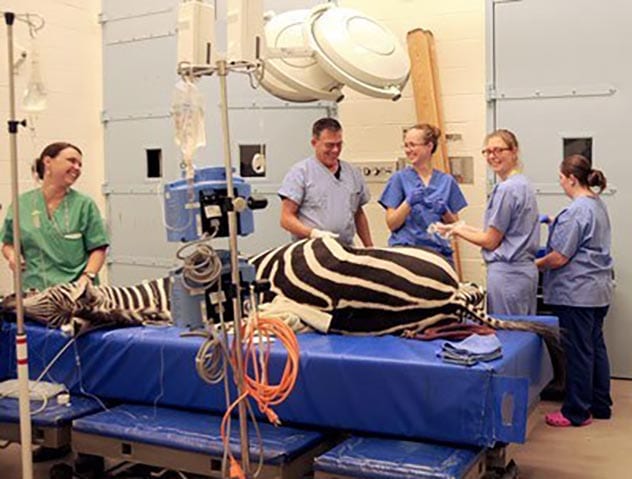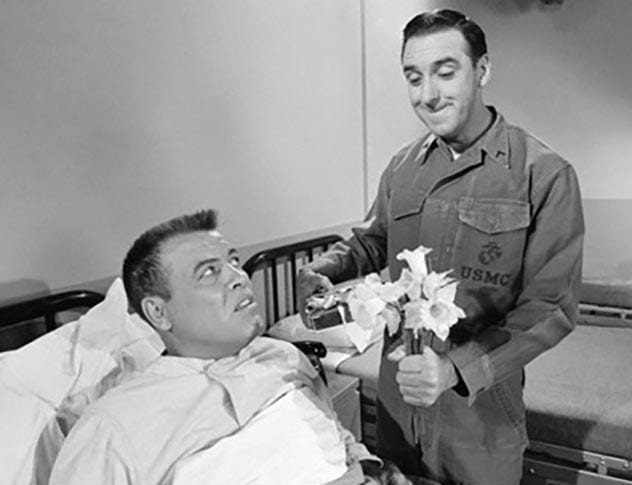See Also: Top 10 Codes You Aren’t Meant To Know Medical terms are sometimes humorous and used to explain some hilarious medical scenario. Others are used to hide more offensive or derogatory statements. And then there is the distinct category of slang used to describe the condition of dying patients, hide controversial medical procedures from their relatives or just refer to the annoying habits of loved ones.
10 John Thomas Sign
The John Thomas, JT or Throckmorton‘s sign is a slang used by physicians to refer to the position of the penis in the X-ray scans of a man’s pelvis. A patient has a positive John Thomas sign if his penis points in the direction of the injured body part and a negative John Thomas sign if it points in the opposite direction. Some physicians believe the position of the penis in x-ray scans is not always coincidental. For instance, men with hip fractures are likelier to have positive John Thomas signs. Physicians believe this is because patients with hip injuries often rest at an angle to avoid pain and discomfort, causing the penis to point towards the injured hip. Logical . . . but weird.[1]
9 Slow Code
Physicians sometimes believe a patient cannot be saved, irrespective of what medical procedure is performed on them. At other times, they could even have concerns that resuscitation attempts could cause more harm than good (in the case of survival with horrific related injuries). However, they do not just abandon the patient to their fate since it could lead to lawsuits, imprisonment, loss of license or worse. So they perform what they call the slow code. A slow code is a deliberately weak attempt at resuscitating a dying patient. Physicians on a slow code will not perform all the life-saving procedures they should. When they do, they perform it sluggishly, hoping the patient will be dead before they are done. The slow code is often the fallout of the difficulties in explaining the condition of the patient to their relatives. So the physicians perform the ruse to trick the relatives of the patient into thinking they are really trying to save the dying. The slow code is a very controversial process, even among nurses and physicians. While some suggest it should only be used as an option of last resort, others insist it is never an option.[2]
8 Medical Zebra
Doctors in training are often told “When you hear the sound of hooves, think horses, not zebras.” The saying uses horses to refer to common diseases and zebras to refer to rarer diseases. The idea is that almost every human is likelier to see a horse than a zebra, except maybe if you live somewhere in the African savanna or near some wildlife park. Rare and common diseases often have similar symptoms and a doctor could easily misdiagnose the symptoms of a common ailment as rare. So the saying encourages doctors to assume the symptoms are caused by the common disease and not the rarer disease. While the slang has probably saved millions from misdiagnoses, it has caused trouble for medical zebras, the slang for patients with rare diseases. Physicians often have a hard time diagnosing people with rare diseases. Medical zebras often visit several physicians and undergo many series of tests before the real cause of their symptoms is discovered.[3]
7 Frequent Fliers
A frequent flier is a patient who frequently reports to a hospital emergency room for non-emergency reasons. They often arrive the emergency room in ambulances or just walk straight-in without any help. Frequent fliers visit the emergency room so often hospital staff know them by their names. Little wonder they are also called high-utilizer, super utilizer or GOMER (Get out of my Emergency Room), which we will mention in the next entry. Some patients become frequent fliers because they do not have insurance and cannot afford a regular doctor visit. So they just go straight to the emergency room where they will always receive treatment. Some have insurance but just prefer to visit the emergency room for unclear reasons. However, the action of the frequent flier is often costly. One study revealed frequent fliers formed 1% of the patients that visited hospitals in Camden, New Jersey. Yet their visits were 30% of the running costs of these hospitals. Another 2009 study revealed nine patients visited the emergency room of a Texan hospital 2,678 times. Their visits cost the hospital $3 million.[4]
6 Get Out Of My Emergency Room
In 1978, Dr. Steve Bergman released his novel “The House of God,” which he wrote under the pseudonym, Samuel Shem. The book is about a medical intern in his first year of internship and is based on his real-life experience at the time he was an intern at Beth Israel Hospital, Boston, between 1973 and 1974. In the book, Dr. Bergman revealed some slang used by doctors. One is GOMER, which means Get out of my Emergency Room. GOMER is a often used for an elderly patient at the brink of death. They are barely alive, cannot perform basic human functions and cannot be saved by medical care. However, they do not die and often go in and out of emergency rooms. Dr. Bergman also revealed other medical slang like turfing, which refers to the act of referring or transferring a patient to another service. This new service could be another hospital, a nursing home, the patient’s home or even a morgue. A physician who refuses to admit a patient or turfs them to another service even before they are admitted is called a wall. There is also the sieve, who is a doctor that only accepts a few patients even though they could admit more. These sort of doctors are often considered a problem. A bounce or bounceback is used to refer to a patient that is readmitted. Another is LOL in NAD, which means Little Old Lady in No Apparent Distress.[5]
5 July Effect
It is said that some doctors advise that people should not allow their friends and families undergo surgeries in teaching hospitals in July. This is because of what physicians call the July effect. Every July, fresh graduates from medical schools resume work as interns in teaching hospitals. Their inexperience means they often make errors. Lots of errors, which causes an abnormal increase in patient deaths. Researchers from the University of California proved that the July effect is real after analyzing over 62 million death certificates issued in the US between 1979 and 2006. They discovered that teaching hospitals often saw a 10% increase in deaths in July.[6]
4 Normal For Norfolk
Normal for Norfolk (or N4N) is a slang for a weird person. It started off as a medical phrase for a patient who cannot correctly describe the symptoms of their ailment or is just odd in some other way. It was also used to refer to a patient from a rural area. We know the slang is named after Norfolk county in Britain even though its origin is uncertain. One source says doctors at Norfolk & Norwich University Hospital created the phrase to refer to mentally retarded patients. Another source indicates the phrase was created by doctors outside Norfolk over concerns that people there have weird characteristics. Weird news reports from Norfolk probably reinforced this stereotype. Once upon a time, news agencies reported that police in Great Yarmouth, Norfolk, detained a driver carrying a wardrobe on top of his car. The wardrobe was only secured on the car with a bubble wrap. Other news reported that Norfolk farmers were hiring humans as scarecrows. Perhaps one of our British readers can shed some light on this in the comments.[7]
3 The Daughter From California
The Daughter from California (or Son from California in the case of men) is a medical term for a person who suddenly arrives at a hospital and demands physicians perform some medical procedures to save the life of a dying relative. Some Physicians sometimes swap California with New York. The Daughter from California is usually angry and pisses the medical staff off. They refuse treatment suggestions, even from fellow relatives, and will continue to force their suggestions on everyone. Physicians consider their actions a syndrome they call Daughter from California syndrome. The Daughter from California is often a distant relative that has not seen the dying relative in a while. So they are often surprised with how bad the situation has deteriorated. Physicians believe the guilt feelings of being away from the sick relative is often responsible for the behavior of the Daughter from California.[8]
2 Funny-Looking Kid
The funny-looking kid (FLK) is used to refer to a child with some unknown growth or mental condition. The funny-looking kid often has a strange face. This could be evident in their flat nose bridges, sloppy foreheads, abnormal looking lips among others. Sometimes, their faces are normal but blank and without expression. To be clear, doctors do not use funny to mean funny in the amusing sense. They use funny to mean odd. Nevertheless, the slang is considered derogatory. The term is only used for children with abnormal faces caused by unidentified medical conditions. It is not used for children with more common medical conditions like Down Syndrome. The parent could also be called a funny-looking parent (FLP) if they have a similar looking face.[9]
1 Social Injury Of The Rectum
Sometimes people stick weird things up their anus. And some of these items get so deep they reach the rectum and become irremovable, prompting a visit to the emergency room. Physicians call these sort of incidents “social injury of the rectum.” Patients with social injury of the rectum often require surgery to remove whatever got stuck up there. Physicians have operated on patients with pens, beer bottles, bowling pins (WTF?!), baseballs, electrical tapes, wine corks, flashlights, cucumbers, fruits and light bulbs stuck in their rectums. Physicians have also removed larger items like wooden rods, ice picks, a soy sauce bottle, a peanut butter jar, the head of a Barbie doll and a bed post from the rectum of patients. For understandable reasons, most patients only complain of abdominal pain and refuse to reveal the real issue whenever they get admitted. They only partly confess after x-rays reveal they have got some other weird stuffs up there. We say partly because they sometimes deny putting anything in their anus and provide hilarious suggestions to explain how those items ended up there. One elderly man said he was using an ice pick to push hemorrhoids into his anus when the ice pick went up his butt (I guess that’s one way to apply Preparation H). Another said he was using a flashlight to force himself to poop when it went in. Yet another unfortunate patient said he was sleepwalking and somehow ended with a light bulb in his rectum. And, finally, a fourth said he fell on a cucumber while showering. Physicians say people do not always put weird things up their rectum for sexual reasons. Some shove items up their anuses because they enjoy the feeling of getting it removed by physicians (wait . . . isn’t that sexual?) Some also ended up with weird stuff in their rectum after eating it (let that be a warning to any budding sword swallowers reading this!)[10]
























